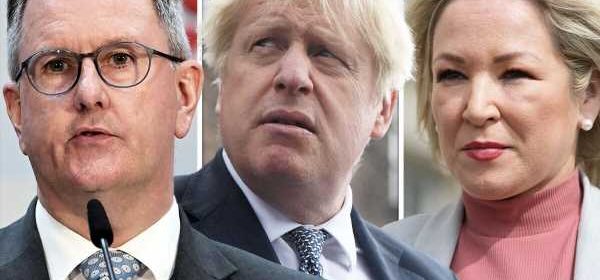Brexit latest: Five key developments as Boris Johnson heads to Stormont

Northern Ireland Protocol 'is working' says Jones
We use your sign-up to provide content in ways you’ve consented to and to improve our understanding of you. This may include adverts from us and 3rd parties based on our understanding. You can unsubscribe at any time. More info
Boris Johnson will make an “emergency visit” to Northern Ireland as Stormont’s legislature remains at the mercy of the DUP, longtime allies of the Conservative Party. The party has refused to cooperate with first-time leaders Sinn Fein while the Northern Ireland protocol remains active. The Prime Minister, whose Government proposed and passed the protocol, has embarked on a months-long campaign to deactivate it but has met several obstacles in recent weeks.
Mr Johnson and his team are pushing ahead this week, however, with a series of crunch meetings aimed at making progress on the main issue: the Northern Ireland Protocol.
The Prime Minister said late last night he will unveil the “next steps” on the Northern Ireland protocol “in the coming days.”
All eyes will be on Belfast today for the PM’s visit, while Foreign Secretary Liz Truss is also due to meet the Minister for Foreign Affairs of Ireland Simon Coveney.
The Council of the EU’s working group on the UK meets Tuesday while European Commission Vice President Maroš Šefčovič will brief EU ambassadors on the state of play on Wednesday.
But as negotiations get underway once again, five latest developments could prove to be the way forward for the talks this week.

DUP “paralyses” Stormont
Sinn Fein has accused the DUP of “paralysing” Stormont, as the party refused to endorse a new speaker on Friday, May 13.
The landmark Good Friday Agreement requires power-sharing from both leading parties, and they cannot elect a cross-party government without a speaker in role.
DUP leader Sir Jeffrey Donaldson said his party would not move forward until the Northern Ireland Protocol, which they believe “erodes the very foundations that devolution has been built upon”, is ditched.
Unilateral action
The UK Government has challenged the EU by threatening to unilaterally abandon the protocol.
The Prime Minister is poised to greenlight a bill that would allow Parliament to override the policy’s most controversial sections.
Ministers risk igniting a trade war with the EU if they seek to remove checks on goods crossing the Irish Sea.
A reformed protocol
Mr Johnson has told Northern Ireland residents that his Government will pursue a “reformed” protocol.
Writing in the Belfast Telegraph, he said “many things have changed” since ministers activated the protocol.
He added that the EU said it was “impossible to make the changes to the protocol text” that would “solve these problems in negotiations”.
Mr Johnson called for a “shared objective” of creating the “broadest possible cross-community support” for a “reformed protocol” in 2024.
Where the EU stands
While he evoked Simon Coveney in his Belfast Telegraph column in calling for a “landing zone”, the Irish foreign minister said the EU would retaliate against any unilateral action pursued by the UK.
He warned that the EU would “be forced to respond to that with some form of retaliatory action”.
Mr Coveney did not disclose how that would look but said any response “would be very negative”.
Incoming Northern Ireland First Minister and Sinn Fein deputy Michelle O’Neill shared his position, urging “joint agreement with the EU”.
She added: “I will be telling Boris Johnson that unilateral action deepens political instability and economic uncertainty and must not happen.”
Business leaders respond
Politicians have cited a negative impact on trade in Northern Ireland in their objection to the protocol.
But a business working group made up of vital organisations such as the Confederation of British Industry, the Institute of Directors NI, Manufacturing NI and more have disputed this.
In a recent letter ahead of the Prime Minister’s visit, the group said it had pleaded with the Government not to pursue unilateral action.
A source told The Guardian they “asked [the Government] specifically not to launch unilateral action”.
They added: “We do not need the nuclear option when we believe there is still a prospect of a deal.”
Source: Read Full Article
